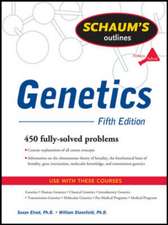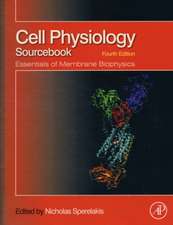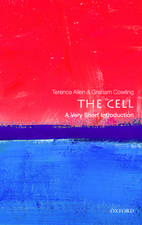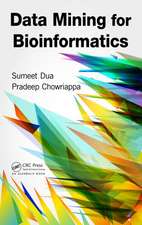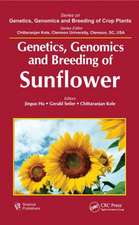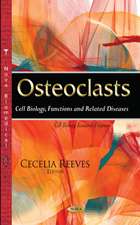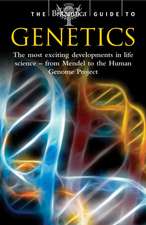Epidermal Cells: Methods and Protocols: Methods in Molecular Biology, cartea 2109
Editat de Kursad Turksenen Limba Engleză Paperback – 14 mar 2020
Comprehensive and cutting-edge, Epidermal Cells: Methods and Protocols, Fourth Edition serves as a valuable reference for experts as well as novices in the epidermal cell field.
| Toate formatele și edițiile | Preț | Express |
|---|---|---|
| Paperback (3) | 682.42 lei 38-44 zile | |
| Springer Us – 14 mar 2020 | 682.42 lei 38-44 zile | |
| Springer – 23 aug 2016 | 701.25 lei 43-57 zile | |
| Humana Press Inc. – 7 mar 2012 | 778.81 lei 38-44 zile | |
| Hardback (3) | 598.64 lei 38-44 zile | |
| Humana Press Inc. – 18 noi 2009 | 598.64 lei 38-44 zile | |
| Springer Us – 15 mar 2020 | 942.64 lei 38-44 zile | |
| Springer – 14 iul 2014 | 956.18 lei 43-57 zile |
Din seria Methods in Molecular Biology
- 9%
 Preț: 791.63 lei
Preț: 791.63 lei - 23%
 Preț: 598.58 lei
Preț: 598.58 lei - 20%
 Preț: 882.98 lei
Preț: 882.98 lei -
 Preț: 252.05 lei
Preț: 252.05 lei - 5%
 Preț: 802.70 lei
Preț: 802.70 lei - 5%
 Preț: 729.61 lei
Preț: 729.61 lei - 5%
 Preț: 731.43 lei
Preț: 731.43 lei - 5%
 Preț: 741.30 lei
Preț: 741.30 lei - 5%
 Preț: 747.16 lei
Preț: 747.16 lei - 15%
 Preț: 663.45 lei
Preț: 663.45 lei - 18%
 Preț: 1025.34 lei
Preț: 1025.34 lei - 5%
 Preț: 734.57 lei
Preț: 734.57 lei - 18%
 Preț: 914.20 lei
Preț: 914.20 lei - 15%
 Preț: 664.61 lei
Preț: 664.61 lei - 15%
 Preț: 654.12 lei
Preț: 654.12 lei - 18%
 Preț: 1414.74 lei
Preț: 1414.74 lei - 5%
 Preț: 742.60 lei
Preț: 742.60 lei - 20%
 Preț: 821.65 lei
Preț: 821.65 lei - 18%
 Preț: 972.30 lei
Preț: 972.30 lei - 15%
 Preț: 660.49 lei
Preț: 660.49 lei - 5%
 Preț: 738.41 lei
Preț: 738.41 lei - 18%
 Preț: 984.92 lei
Preț: 984.92 lei - 5%
 Preț: 733.29 lei
Preț: 733.29 lei -
 Preț: 392.60 lei
Preț: 392.60 lei - 5%
 Preț: 746.26 lei
Preț: 746.26 lei - 18%
 Preț: 962.66 lei
Preț: 962.66 lei - 23%
 Preț: 860.22 lei
Preț: 860.22 lei - 15%
 Preț: 652.64 lei
Preț: 652.64 lei - 5%
 Preț: 1055.50 lei
Preț: 1055.50 lei - 23%
 Preț: 883.87 lei
Preț: 883.87 lei - 19%
 Preț: 491.89 lei
Preț: 491.89 lei - 5%
 Preț: 1038.86 lei
Preț: 1038.86 lei - 5%
 Preț: 524.16 lei
Preț: 524.16 lei - 18%
 Preț: 2122.34 lei
Preț: 2122.34 lei - 5%
 Preț: 1299.23 lei
Preț: 1299.23 lei - 5%
 Preț: 1339.12 lei
Preț: 1339.12 lei - 18%
 Preț: 1390.26 lei
Preț: 1390.26 lei - 18%
 Preț: 1395.63 lei
Preț: 1395.63 lei - 18%
 Preț: 1129.65 lei
Preț: 1129.65 lei - 18%
 Preț: 1408.26 lei
Preț: 1408.26 lei - 18%
 Preț: 1124.92 lei
Preț: 1124.92 lei - 18%
 Preț: 966.27 lei
Preț: 966.27 lei - 5%
 Preț: 1299.99 lei
Preț: 1299.99 lei - 5%
 Preț: 1108.51 lei
Preț: 1108.51 lei - 5%
 Preț: 983.76 lei
Preț: 983.76 lei - 5%
 Preț: 728.16 lei
Preț: 728.16 lei - 18%
 Preț: 1118.62 lei
Preț: 1118.62 lei - 18%
 Preț: 955.25 lei
Preț: 955.25 lei - 5%
 Preț: 1035.62 lei
Preț: 1035.62 lei - 18%
 Preț: 1400.35 lei
Preț: 1400.35 lei
Preț: 682.42 lei
Preț vechi: 886.25 lei
-23% Nou
Puncte Express: 1024
Preț estimativ în valută:
130.62€ • 141.93$ • 109.79£
130.62€ • 141.93$ • 109.79£
Carte tipărită la comandă
Livrare economică 16-22 aprilie
Preluare comenzi: 021 569.72.76
Specificații
ISBN-13: 9781071602539
ISBN-10: 1071602535
Pagini: 301
Ilustrații: XII, 301 p. 57 illus., 43 illus. in color.
Dimensiuni: 178 x 254 mm
Ediția:4th ed. 2020
Editura: Springer Us
Colecția Humana
Seria Methods in Molecular Biology
Locul publicării:New York, NY, United States
ISBN-10: 1071602535
Pagini: 301
Ilustrații: XII, 301 p. 57 illus., 43 illus. in color.
Dimensiuni: 178 x 254 mm
Ediția:4th ed. 2020
Editura: Springer Us
Colecția Humana
Seria Methods in Molecular Biology
Locul publicării:New York, NY, United States
Cuprins
The Simplest Protocol for Rapid and Long-Term Culture of Primary Epidermal Keratinocytes from Human and Mouse.- Dermal-Epidermal Separation by Heat.- Dermal-Epidermal Separation by Enzyme.- Dermal-Epidermal Separation by Chemical.- Isolation and Characterization of Extracellular Vesicles from Keratinocyte Cultures.- Competitive Repopulation Assay of Long-Term Epidermal Stem Cell Regeneration Potential.- Quantification of Melanosome Transfer Using Immunofluorescence Microscopy and Automated Image Analysis.- Contribution of Immunohistochemistry in Revealing S100A7/JAB1 Colocalization in Psoriatic Epidermal Keratinocyte.- Digital Quantification of Epidermal Protein Expression in Paraffin-Embedded Tissue Using Immunohistochemistry.- Keratinocyte Differentiation by Flow Cytometry.- In Silico and In Vitro Considerations of Keratinocyte Nuclear Receptor Protein Structural Order for Improving Experimental Analysis.- Genetic Modification of Human Primary Keratinoctes by Lentiviral Vectors.- Generation of Knockout Human Primary Keratinocytes by CRISPR/Cas9.- In Vitro Wound Healing Assays to Investigate Epidermal Migration.- Iterative Three-Dimensional Epidermis Bioengineering and Xenografting to Assess Long-Term Regenerative Potential in Human Keratinocyte Precursor Cells.- Generation of a Full-Thickness Human Skin Equivalent on an Immunodeficient Mouse.- Biotin Identification Proteomics in Three-Dimensional Organotypic Human Skin Cultures.- Information and Statistical Analysis Pipeline for High-Throughput RNA Sequencing Data.- Cell-Extracellular Matrix Adhesion Assay.- Methods for Analysis of Keratinocyte Migration.- Scratch Wound Healing Assay.- Photoprotective Activity Assay toward Ultraviolet B in Human Keratinocytes.- Photodynamic Therapy Assay.- A Method to Prepare Claudin-Modulating Recombinant Proteins.- Human Fetal Skin Fibroblast Isolation and Expansion for Clinical Application.- Ciliated Epithelial Cell Differentiation at Air-Liquid Interface Using Commercially Available Culture Media.
Textul de pe ultima copertă
This fully updated edition brings together a new set of protocols to arm epidermal cell biologists with tools and approaches to continue the quest to uncover the intricacies and regulatory mechanisms underlying epidermal cell development and function. The collection takes a detailed view at techniques currently being applied to this developing field. Written for the highly successful Methods in Molecular Biology series, chapters include introductions to their respective topics, lists of the necessary materials and reagents, step-by-step, readily reproducible laboratory protocols, and tips on troubleshooting and avoiding known pitfalls.
Comprehensive and cutting-edge, Epidermal Cells: Methods and Protocols, Fourth Edition serves as a valuable reference for experts as well as novices in the epidermal cell field.
Caracteristici
Includes cutting-edge techniques Provides step-by-step detail essential for reproducible results Contains key implementation advice from the experts
Recenzii
From the reviews of the second edition:
“This book introduces a wide variety of laboratory protocols for isolating and analyzing the differentiation potential of mammalian epidermal cells. … The book is written for basic science investigators … . will also be appreciated by clinicians interested in experimental dermatology and dermatopathology. … This is an important contribution to the literature in adult stem cell biology. … the theoretical and practical importance of this research and the diversity of topics will help this volume capture the attention of a wide audience of readers.” (Bruce A. Fenderson, Doody’s Review Service, July, 2010)
“This book introduces a wide variety of laboratory protocols for isolating and analyzing the differentiation potential of mammalian epidermal cells. … The book is written for basic science investigators … . will also be appreciated by clinicians interested in experimental dermatology and dermatopathology. … This is an important contribution to the literature in adult stem cell biology. … the theoretical and practical importance of this research and the diversity of topics will help this volume capture the attention of a wide audience of readers.” (Bruce A. Fenderson, Doody’s Review Service, July, 2010)

